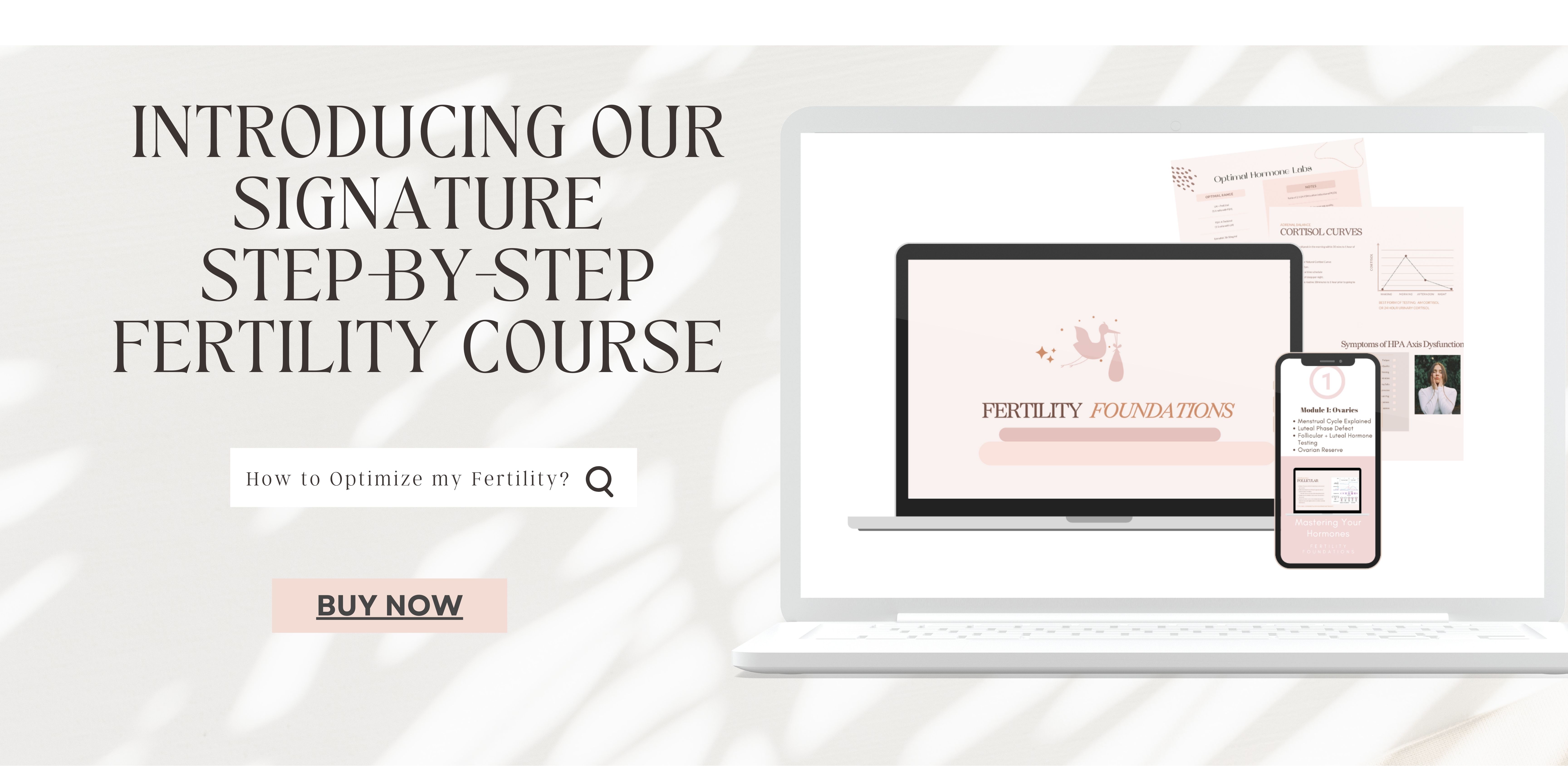
Getting Pregnant with Endometriosis
Endometriosis is said to impact 10-15 percent of all women of reproductive age. Unfortunately, for many women, diagnosis can take years. In fact, on average, from the onset of symptoms to diagnosis, the median time interval is 7 years. Many women with endometriosis will experience pelvic or abdominal pain, especially during their period as well as with intercourse, however some will have no symptoms. Endometriosis are often treated with birth control and other estrogen lowering medications to improve symptoms. For more extreme cases, surgery may be required. Although birth control may be an effective treatment, if you are trying to get pregnant, birth control is no longer an option which can make it very challenging and overwhelming for many women. So today, I thought I would address some important questions about getting pregnant with endometriosis including does endometriosis cause infertility and what are your treatment options.
Does Endometriosis Cause Infertility?
Endometriosis itself does not cause infertility, however, it is estimated that up to 30-50% of women with endometriosis will experience difficulty getting pregnant. Endometriosis can influence your fertility in a few important ways including: scarred fallopian tubes, inflammation of pelvic structures, altered immune system and function, changes in hormonal environment of the egg, imparied implantation as well as altered egg quality. If you or someone you love have confirmed or suspected endometriosis, it is important to seek medical support at the start of your preconception journey.
Even for women with suspected endometriosis, early discussions with your OBGYN are important for proper screening and can increase your chances of a successful pregnancy. In fact, a meta-analysis reported that operative laparoscopy nearly doubled the live birth or ongoing pregnancy rate in women undergoing their first laparoscopic procedure of endometriosis.
However, although primary resection appeared to make a big difference in pregnancy rates, repeat surgeries may not. Although repeat surgeries can help reduce pain, they often do not seem to improve fertility rates. The major fertility benefit of surgical therapy is generally achieved shortly after the first procedure. Researchers believe this is likely associated with the severity of the disease.. In fact, analysis of three observational studies that included 313 women reported lower pregnancy rates after repeat surgery compared with primary surgical intervention. So again, more isn’t always better.
If you have endometriosis, your doctor will likely suggest meeting with a reproductive endocrinologist for a more in-depth fertility evaluation. Now again, although we often hear that if we are under 35 years old, we must wait one year before further fertility evaluation can be done, this is not the case for those suffering from diagnosed or suspected endometriosis.Please make sure you are taking a proactive approach and begin this conversation with your doctor as soon as you decide you would like to start a family. The same is true for those above 35 years old. You do not need to wait 6 months to be evaluated. You already have an underlying condition that requires additional counseling and support.
Now, although IVF may be mentioned as a treatment option, the severity of your endometriosis and a comprehensive history will allow us to better determine the best course of action. At NMD Wellness of Scottsdale, we have helped many women with endometriosis (often Stage I/II), get pregnant naturally, without the need for IVF. We have also helped patients with more severe cases alongside their reproductive endocrinologist during IVF with great success.
Getting Pregnant with Endometriosis
As I mentioned, the severity of your disease will absolutely dictate your available treatment approach and plan; however, more and more research is emerging about the importance that lifestyle and dietary modifications not only for natural conception but during assisted fertility treatments, like IVF, in patients with endometriosis. So, whether you are considering natural conception or gearing up for IVF, the following information can be useful for you during your journey.
Isoflavones
Estrogen is an important hormone that normally controls the growth of the endometrium. Unfortunately, imbalances in estrogen are commonly seen in endometriosis and can exacerbate symptoms including pain with intercourse. If you can’t tolerate intercourse, especially around the time of ovulation, this can make it harder to get pregnant.
Isoflavones are thought to improve symptoms of endometriosis because they can inhibit the conversion of androgens (male hormones) to estrogen. The use of isoflavones can be an important way to improve estrogen metabolism and most importantly, your symptoms.
Foods Rich In Isoflavones Include:
-
Soybeans
-
Chickpea
-
Miso
-
Tempeh
-
Natto
-
Fava bean
Now, before you start adding isoflavones to your diet, it is very important to know that if you have a thyroid disorder, like Hashimoto’s Thyroiditis, you will want to be careful with the amount of isoflavones you include in your diet, especially unfermented sources, like soy based product. Unfermented GMO sources may worsen your Hashimoto’s thyroiditis. This is where consulting with a licensed naturopathic/functional medicine doctor can be extremely valuable.
Indoles
Another important plant-derived compound that can be beneficial for endometriosis are indoles. Indoles are thought to be anti-estrogenic. Many of the plant-derived foods are found in cruciferous vegetables, especially the Brassica family which includes:
-
Broccoli
-
Kale
-
Cabbage
-
Cauliflower
-
Brussel Sprouts
-
Bok Choy
Indoles can negatively impact autoimmunity for those with Hashimoto’s thyroiditis so we suggest making sure you do not exceed 1lb of raw cruciferous vegetables per day.
Luckily, the negative impact seen in cruciferous vegetables appears to occur only when eaten in their raw form. Making sure you lightly steamed or sauteed your cruciferous vegetables can reduce this concern.
Toxins + Fats
Studies suggest that exposure to certain toxins, especially dioxins and polychlorinated biphenyls (PCBs) over time may increase, not only the risk of endometriosis but, the disease progression. This means that if you have or suspect you have endometriosis, reducing your environmental toxin exposure is extremely important. Reducing your exposure to processed foods, and foods high in saturated fats appear to lower this risk. Focusing on high quality proteins like grass-fed, grass-finished meats, as well as, high quality organic fruits and vegetables are an important way to improve your chance of conception if you suffer from endometriosis.
Bio-identical Hormone Replacement - Progesterone
One of the ways we can reduce the severity and extent of endometriosis is by targeting the tissue’s blood supplement. The use of bio-identical progesterone, after ovulation, could help block the pathways that lead to endometrial lesions and prevent the development of new blood vessels. Bioidentical progesterone can be delivered as a cream, taken orally or even as an injection. At NMD Wellness of Scottsdale, we generally like the convenience and usage of oral progesterone, however other forms can be effective. For safety reasons, progesterone should only be used under the guidance of your doctor. Progesterone should be prescribed by your doctor and should not be bought over- the- counter. Not only is over- the -counter progesterone potentially dangerous but, it could impede your ability to get pregnant, if taken incorrectly.
CoQ10
Coq10 is an important fat-soluble nutrient that has grown in popularity in the last few years as new research has emerged suspecting that supplemental CoQ10 could improve egg quality and potentially lead to a better chance of achieving a healthy pregnancy, both naturally and during assisted fertility treatments, like IVF.
About the Author: Meet Dr. Zen Alissia Zenhausern- Pfeiffer, NMD, FABNE, (commonly known by her patients as Dr. Zen), is a licensed naturopathic doctor board certified in naturopathic endocrinology and the founder of NMD Wellness of Scottsdale, a premier naturopathic medical practice that focuses on helping women to take a proactive approach to their hormone and fertility health. Dr. Zen has been featured as a lead expert in Forbes, Shape Magazine, and Instyle and is deeply passionate about bridging the gap between traditional and natural medicine in the world of fertility. She works with a variety of hormone related issues including PCOS, endometriosis and unexplained infertility. Her goal is to help more women get back into the driver’s seat of their own health to make lasting transformational changes to their health to bring more cute and adorable babies into this world. Read More About Dr. Zen...
Alissia Zenhausern- Pfeiffer, NMD, FABNE, (commonly known by her patients as Dr. Zen), is a licensed naturopathic doctor board certified in naturopathic endocrinology and the founder of NMD Wellness of Scottsdale, a premier naturopathic medical practice that focuses on helping women to take a proactive approach to their hormone and fertility health. Dr. Zen has been featured as a lead expert in Forbes, Shape Magazine, and Instyle and is deeply passionate about bridging the gap between traditional and natural medicine in the world of fertility. She works with a variety of hormone related issues including PCOS, endometriosis and unexplained infertility. Her goal is to help more women get back into the driver’s seat of their own health to make lasting transformational changes to their health to bring more cute and adorable babies into this world. Read More About Dr. Zen...


